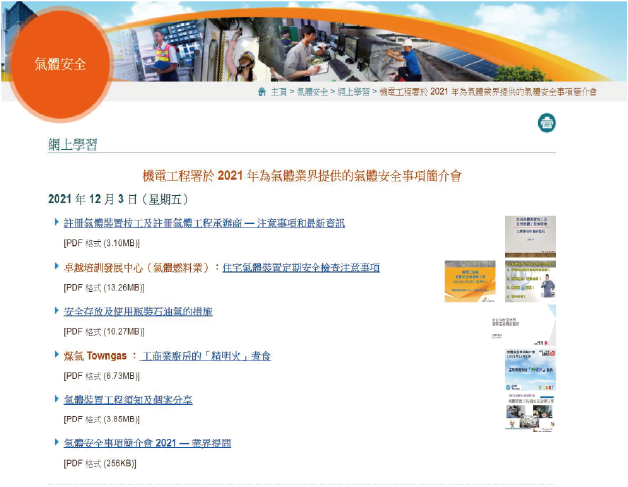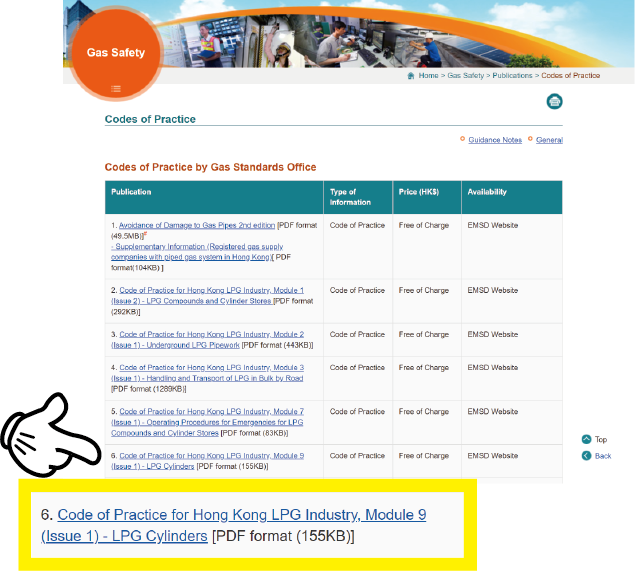Gas Safety Bulletin - 34th Issue (August 2022)
 Contents
Contents
Message from the Editor
01. Features
- Best Practices of Operation and Maintenance
- e-Services - Web-based Registration Services
- Voluntary CPD Scheme for RGI - Seminar on Gas Safety
02. Did You Know
- Correct Steps to Change Liquefied Petroleum Gas Cylinders for Commercial and Industrial Use
- Proper Handling of Liquefied Petroleum Gas Cylinders
- New Gas Installer Registration Card and Electronic Card
- Voluntary Continuing Professional Development Scheme for Registered Gas Installers
03. Legal Knowledge
04. Case Sharing
05. Statistics
Message from the Editor
 Hello, everyone! In this issue of the Gas Safety Bulletin, we will talk about the latest developments in the gas industry and new initiatives introduced by the Electrical and Mechanical Services Department (EMSD). To align with the Government's efforts in promoting the electronic public service, the Gas Standards Office has now provided the electronic version of all of its 27 application forms and launched a brand-new Gas Installer Electronic Registration Card. Moreover, in the coming year, we will introduce a Voluntary Continuing Professional Development Scheme for Registered Gas Installers to further promote the culture of continuing education among workers in the gas industry.
Hello, everyone! In this issue of the Gas Safety Bulletin, we will talk about the latest developments in the gas industry and new initiatives introduced by the Electrical and Mechanical Services Department (EMSD). To align with the Government's efforts in promoting the electronic public service, the Gas Standards Office has now provided the electronic version of all of its 27 application forms and launched a brand-new Gas Installer Electronic Registration Card. Moreover, in the coming year, we will introduce a Voluntary Continuing Professional Development Scheme for Registered Gas Installers to further promote the culture of continuing education among workers in the gas industry.
In addition, we have also compiled a handbook on the best practices of operation and maintenance of gas utilisation facilities to provide exemplary practices for liquefied petroleum gas (LPG) vehicle mechanics and registered gas installers of commercial gas appliances so as to further enhance the safety performance of gas installations.
Feature 1
Best Practices of Operation and Maintenance:
Handbook on Design, Operation and Maintenance of Gas Utilisation Facilities and
Best Practices for Maintenance of Fuel System of Liquefied Petroleum Gas Vehicles
To enhance quality management of electrical and mechanical (E&M) installations in the E&M industry, the EMSD has published eight booklets and handbooks on the best practices of operation and maintenance in various E&M areas (including heating, ventilation and air conditioning (HVAC) installations, lift and escalator installations, electrical installations, fire service installations, solar photovoltaic systems, solar water heating systems, gas utilisation facilities and fuel system of LPG vehicles) for reference of the trade, owners and management professionals of the installations/facilities/vehicles, clients and other stakeholders.
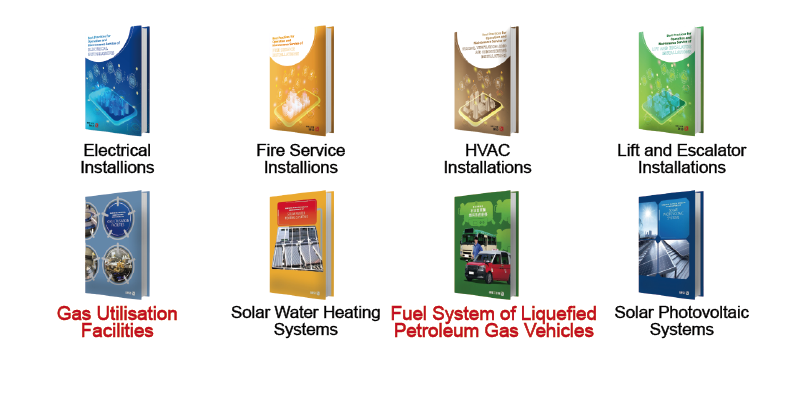
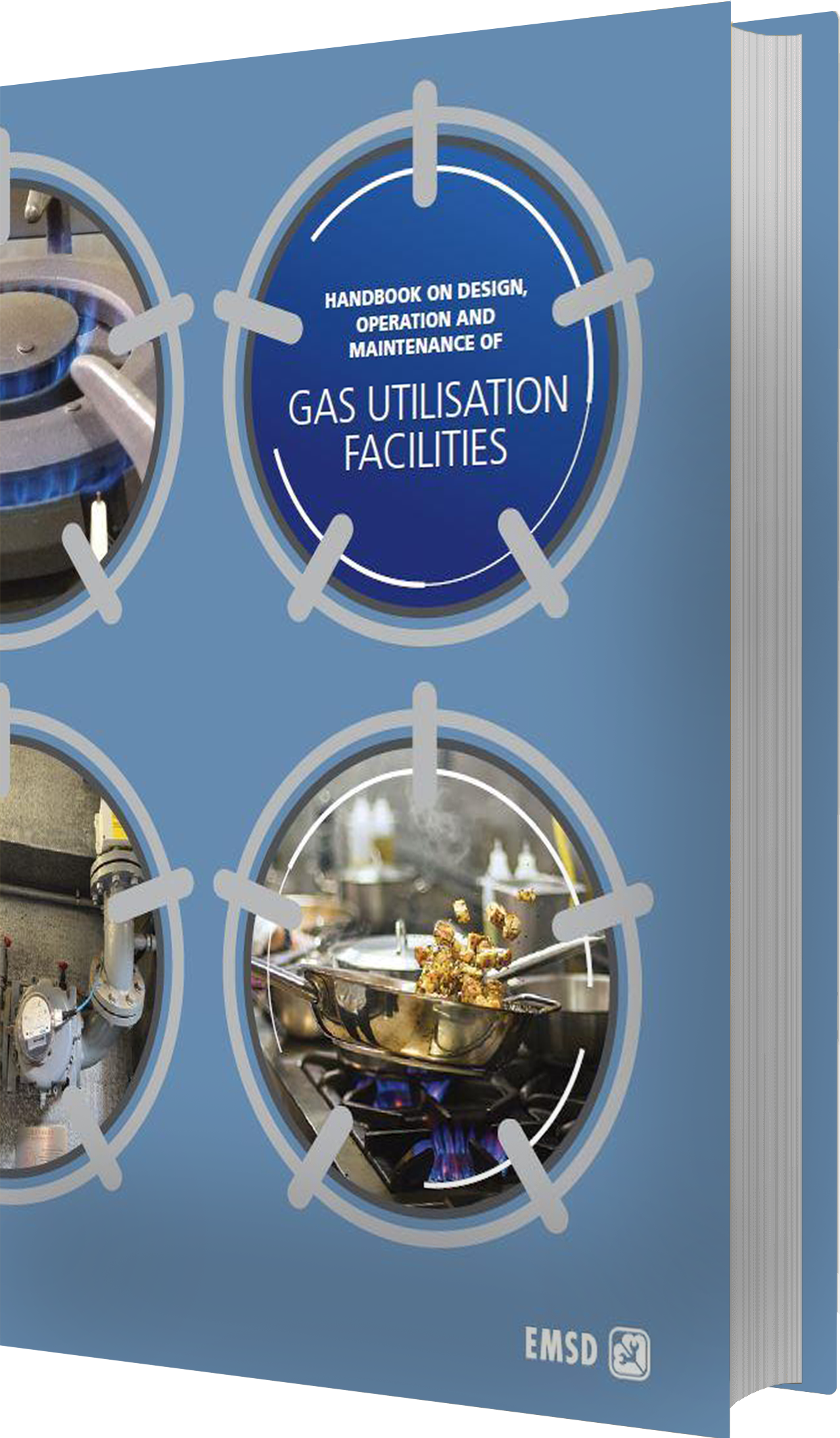
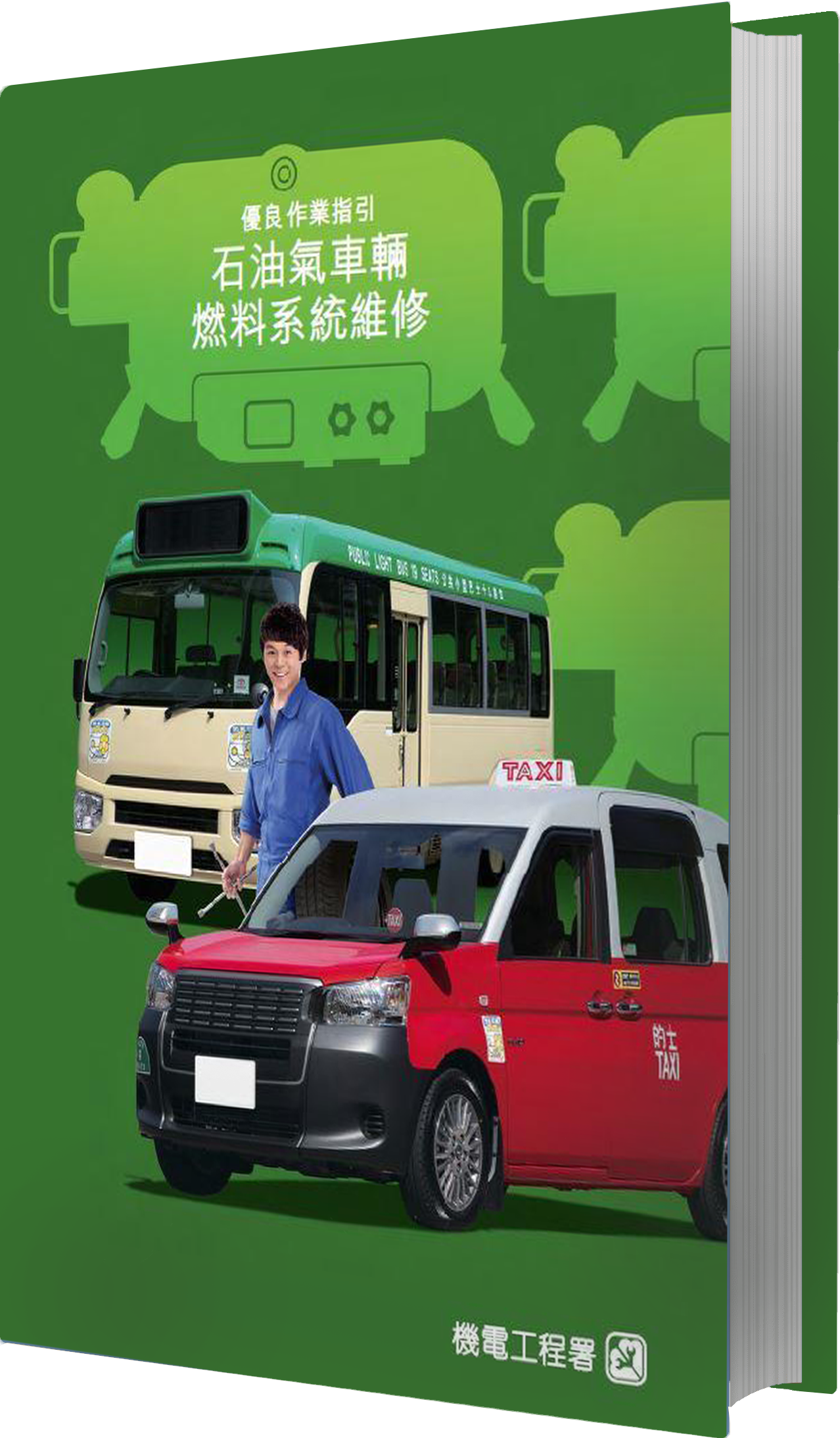 Gas Utilisation Facilities & Fuel System of LPG Vehicles
Gas Utilisation Facilities & Fuel System of LPG Vehicles
Two of the publications, namely Handbook on Design, Operation and Maintenance of Gas Utilisation Facilities and Best Practices for Maintenance of Fuel System of LPG Vehicles (Traditional Chinese version), provide the trade with relevant information and tips on gas installation work and maintenance of fuel system of LPG vehicles and set out "General Practices" / "Basic Requirements" and "Best Practices" for reference of the trade.
"General Practices" / "Basic Requirements" refer to requirements that must be met in fulfilling statutory requirements and guidelines as well as aligning common practices in the trade, while "Best Practices" refer to a range of exemplary practices and innovative technologies which are identified and referred to at the time of preparation and revision of the handbooks. We encourage members of the gas trade to adopt the “Best Practices” so as to further enhance the level of operational safety regarding gas installations and maintenance works of fuel system of LPG vehicles.
The handbooks have been uploaded onto the EMSD website and EMSD mobile application for public reference. Here are the link and the QR code:
 e-booklet platform of EMSD Operation and Maintenance (O&M) Best Practices
e-booklet platform of EMSD Operation and Maintenance (O&M) Best Practices
For enquiries about the contents of the handbooks, please email to gasso@emsd.gov.hk.
Feature 2
e-Services - Web-based Registration Services
Online Application for Registration
The Gas Standards Office has now provided online application services for registration to facilitate the submission by the gas industry. 27 application forms as listed below for 11 registration items are covered:
| Form 1 Form RGI |
New Application for Registration as a Gas Installer/Application for Change of Class of Registration for Registered Gas Installer Application for Replacement of Lost / Destroyed Registered Gas Installer Card |
|---|---|
| Form 101 | Application to Become a Competent Person |
| Form 103 | Application to Become a Gas Systems Contractor for LPG Compounds, Cylinder Stores And Mains |
| Form 104 | Application for Construction Approval of Notifiable Gas Installation |
| Form 105 | Application for Approval of Use of Notifiable Gas Installation |
| Form 106 | Report of Testing and Examination of LPG Tank |
| Form 107 | Report of Testing and Examination of LPG Vaporiser |
| Form 108 | Report of Testing and Examination of LPG Pipes |
| Form 109 Form 109A Form 109B |
Report of Annual Inspection of LPG Storage Installation Annual Inspection Report of LPG Filling Station Annual Inspection Report of NGI LPG Vehicle Maintenance Workshop |
| Form 110 | Application for Approval of Container |
| Form 112 | Application for Road Tanker Permit to Convey Liquefied Petroleum Gas In Bulk |
| Form 113 | Record of Competent Person Employed On LPG Road Tankers |
| Form 114 | Annual Record Update For Competent Person Employed on LPG Road Tanker |
| Form 2 Form RGC |
New Application for Registration as a Gas Contractor Application for Replacement of Lost / Destroyed Registered Gas Contractor Certificate |
| Form 201 | Application For Registered Gas Supply Company / Change of Gas Business / Change of Company Particulars / Replacement of Certificate of Registration |
| Form 3 | New Application/Renewal for Permit for Conveyance of LPG Cylinders on Gas Vehicle |
| Form BISA | Blue Identification Signage Application |
| Form GS4/01 | Test and Examination Report of LPG Fuel Tanks for LPG Vehicles |
| Form GS4/02 | LPG Vehicle Fuel Tanks Detachment / Replacement Form |
| Form GU01 | Approval of Flexible Gas Tubings For Low Pressure Applications |
| Form GU05-01 Form GU05-02 |
Approval of Domestic Gas Appliance (New or Renewal Application) Approval of Domestic Gas Appliance (Application for Changes of Approved Appliance) |
| Form GU05-03 | Declaration on Local Quality Assurance Inspection |
| Form GU15 | Flexible Gas Tubing For Commercial Applications |
| Form GU18 | Application for Listing of LPG Lighter (New and Renewal) |
| Form VFTSC | Certificate for Scrapping LPG Fuel Tank |
Feature 3
Voluntary Continuing Professional Development (CPD) Scheme
Gas Safety Briefing for Registered Gas Installers (RGI) etc.

The gas safety briefing 2021 had been successfully held on 3 December in the lecture theatre of the EMSD Headquarters in Kowloon Bay. Colleagues from the Gas Standards Office joined hands with representatives from the Hong Kong and China Gas Company Limited and the Pro-Act Training and Development Centre of the Vocational Training Council and provided the participants with various detailed information on gas safety.
The topics of the seminars included:
- Points to Note and Updated Information for Registered Gas Installers and Registered Gas Contractors,
- Points to Note for Regular Safety Inspection of Domestic Gas Installations,
- Measures for Safe Storage and Use of Cylinder Liquefied Petroleum Gas,
- Smart Cooking in Industrial and Commercial Kitchens, and
- Guide to Installation Works of Gas Appliances and Case Sharing.
Participants could join the briefing on the spot and live broadcast on the web was also available. There was a total of about 200 participants and the response was positive.
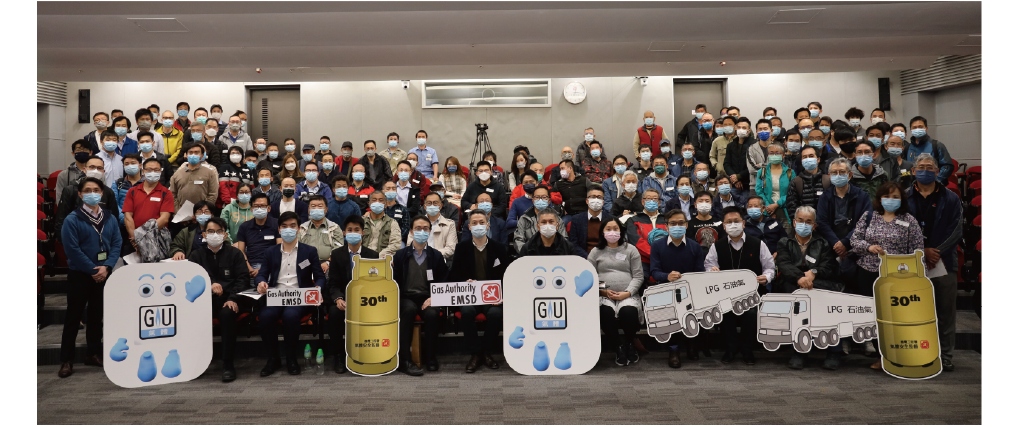
Did You Know 1
Correct Steps to Change Liquefied Petroleum Gas (LPG) Cylinders for Commercial and Industrial Use
 Since LPG is an inflammable substance, extra attention must be paid to ensure safety and prevent gas leakage when changing a LPG cylinder, or serious consequence may be resulted.
Since LPG is an inflammable substance, extra attention must be paid to ensure safety and prevent gas leakage when changing a LPG cylinder, or serious consequence may be resulted.
LPG cylinders for commercial and industrial use are normally equipped with Prest-O-Lite (POL) Valves and the change of LPG cylinders should as far as possible be carried out by LPG distributors. If the users need to change the LPG cylinders by themselves, they should ask the LPG distributors to demonstrate the correct steps beforehand for the sake of safety.
 The change of LPG cylinders should only be done by bare hands without using any tools.
The change of LPG cylinders should only be done by bare hands without using any tools.
In case of abnormality, the "POL valve" should be switched off immediately and Registered Gas Contractor should be called to follow up.
|
1
|
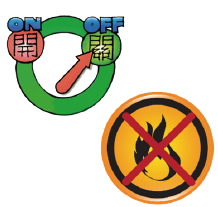 Before changing the LPG cylinder, switch off all gas appliances, put out all sources of ignition in the vicinity and maintain good ventilation. Before changing the LPG cylinder, switch off all gas appliances, put out all sources of ignition in the vicinity and maintain good ventilation. |
5
|
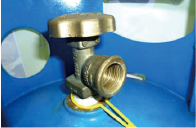 When connecting a new LPG cylinder, check the inner thread of the cylinder valve and the outer thread of the regulator handwheel to ensure that they are not damaged. When connecting a new LPG cylinder, check the inner thread of the cylinder valve and the outer thread of the regulator handwheel to ensure that they are not damaged. |
|
2
|
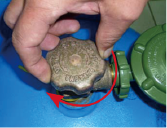 Close the cylinder valve completely by turning it clockwise. Close the cylinder valve completely by turning it clockwise. |
6
|
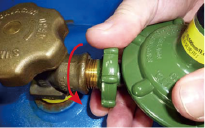 When reconnecting the regulator to the LPG cylinder, turn the regulator handwheel anticlockwise until tight interlock with the cylinder valve is secured (please bear in mind that no tools should be used). When reconnecting the regulator to the LPG cylinder, turn the regulator handwheel anticlockwise until tight interlock with the cylinder valve is secured (please bear in mind that no tools should be used). |
|
3
|
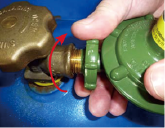 Turn the regulator handwheel clockwise and disconnect the regulator. Turn the regulator handwheel clockwise and disconnect the regulator. |
7
|
After the regulator is securely connected, check to see if the cylinder valve and the regulator are closely connected and ensure that there is no clearance.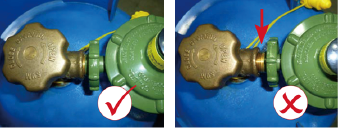 |
|
4
|
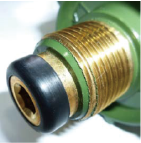 Check the rubber ring of the regulator to ensure that it is not cracked or damaged. Check the rubber ring of the regulator to ensure that it is not cracked or damaged. |
8
|
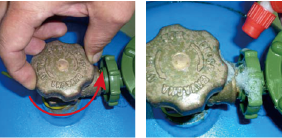 Then open the cylinder valve and instantly apply soapy water at the joint for testing. If the connection is sound, there should be no soap bubbles at the joint. Then open the cylinder valve and instantly apply soapy water at the joint for testing. If the connection is sound, there should be no soap bubbles at the joint. |
Ensure
that there is no smell and no leakage or hissing sound from the joint before switch on the gas appliance again.
 You may refer to the following leaflet for the procedures for changing LPG cylinders for commercial and industrial use:
You may refer to the following leaflet for the procedures for changing LPG cylinders for commercial and industrial use:
Correct Steps to Change LPG Cylinders with Prest-O-Lite (POL) Valves
Did You Know 2
Proper Handling of Liquefied Petroleum Gas Cylinders
LPG cylinders cannot be handled as general waste. Unscrupulous dumping of LPG cylinders in public places, such as on the road or at refuse collection points, does not only cause pollution and affect environmental hygiene, but may also endanger public safety. Disposal of the above said cylinders, whether or not they are housing gaseous content or other materials, is subject to control under the Fixed Penalty (Public Cleanliness and Obstruction) Ordinance (Cap. 570), the Public Cleansing and Prevention of Nuisances Regulation (Cap. 132BK) and the Waste Disposal Ordinance (Cap. 354). Improper disposal will lead to prosecution.
 Points to note for disposing LPG cylinders:
Points to note for disposing LPG cylinders:
-
Return the LPG cylinders that have been used or no longer in use to the LPG distributors as soon as possible, or call the 24-hour emergency hotline of the relevant registered gas supply company for collection.
Registered Gas Supply Company | Brand | 24-hour emergency hotline |
|---|---|---|
| The Hong Kong and China Gas Company (Towngas) | 2880 6999 | |
| ExxonMobil Hong Kong Limited IP&E GBA Limited |
Esso: | 2435 4511 |
| Mobil: | 2495 3518 | |
| Chevron Hong Kong Limited | Caltex / Peninsula: | 2588 7640 |
| Sinopec (HK) Petroleum Holding Company Limited | Sinopec: | 2433 2111 |
| Concord Oil (HK) Limited | Concord: | 2333 4215 |
| Rise Smart Industrial Limited | New Ocean: | 6672 3328 |
| DSG Energy Limited | Shell LPG: | 2322 2000 |
Did you know 3
New Registered Gas Installer Card and Electronic Card
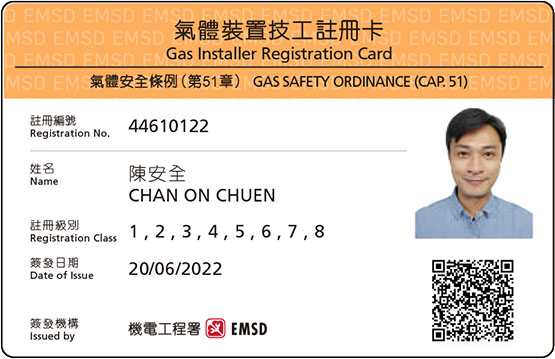 Replacement of Registered Gas Installer Card
Replacement of Registered Gas Installer Card

The Gas Standards Office started issuing new Registered Gas Installer (RGI) Cards on 20 June 2022 and replacing cards for RGIs. The first replacement of RGI Cards is free. RGIs only need to submit a completed application form with two identity photos by email or post.
 Please scan the QR code or follow the link below to download the application form:
Please scan the QR code or follow the link below to download the application form:
Application Form of Replacement - New Registered Gas Installer (RGI) Card
(Traditional Chinese version)
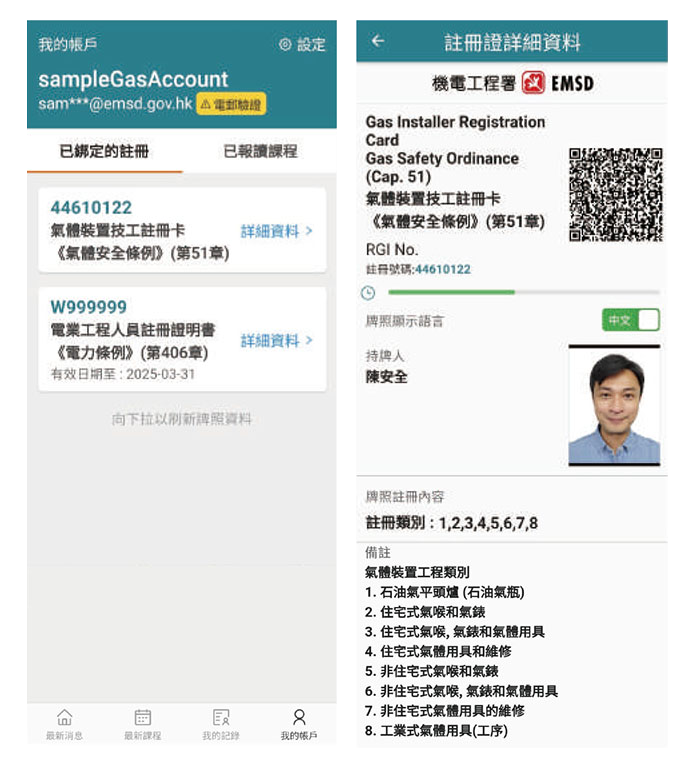 Electronic Registered Gas Installer Card
Electronic Registered Gas Installer Card
From 20 June 2022 onwards, RGIs can log in the EMSD's mobile app "E&M Trade App" by mobile device via "iAM Smart" for inspecting and presenting their digital E&M licence.
 Please scan the QR code to watch a video demonstrating the steps:
Please scan the QR code to watch a video demonstrating the steps:
Using "Digital E&M Licences" service on "E&M Trade App"
(Cantonese dialogue)
 Please scan the QR code on the right or follow this link to download the "E&M Trade" App.
Please scan the QR code on the right or follow this link to download the "E&M Trade" App.

"E&M Trade App" "iAM Smart"
Did You Know 4
Voluntary Continuing Professional Development Scheme for Registered Gas Installers
The EMSD has all along been encouraging E&M practitioners to pursue continuous studies, in order to enhance their professional standards. With reference to the successful experience regarding the existing Continuing Professional Development (CPD) Schemes for various E&M trades, the EMSD is planning to launch a voluntary CPD scheme for gas installers. The industry is supportive of the Scheme and agrees that the Scheme will be able to reinforce the skill level of gas installers and enhance the image of the trade. After discussion, the Gas Safety Advisory Committee has decided to formally launch the Scheme in January 2023. Relevant details will be announced in due course.

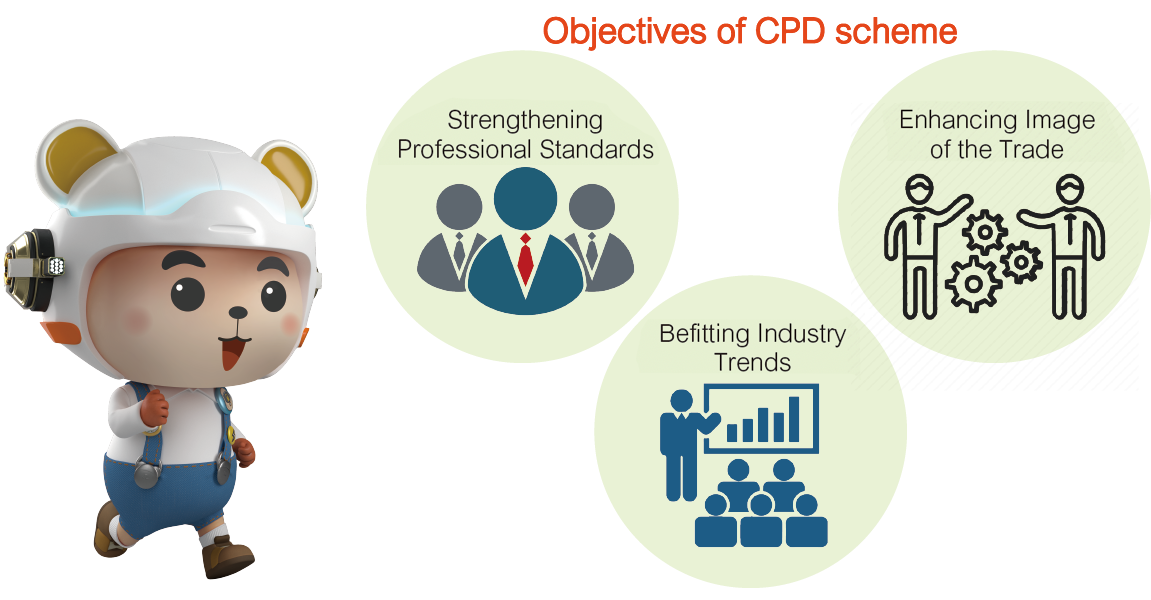
Legal Knowledge
Use of Liquefied Petroleum Gas Cylinder Wagons on the Road and Their Parking Locations
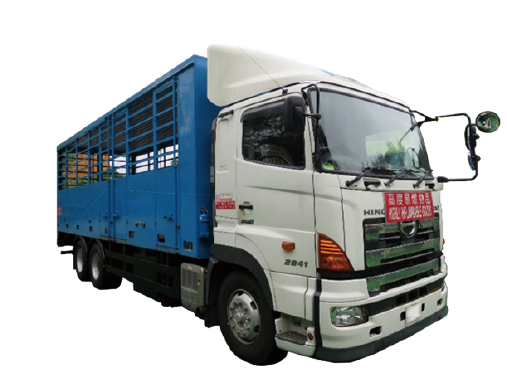 Any person using a motor vehicle to carry LPG cylinder(s) with a water capacity of over 130 litres on a road must use an LPG cylinder wagon issued with a valid permit by the Gas Authority. When using an LPG cylinder wagon, in addition to complying with relevant regulations under the Gas Safety Ordinance, the additional conditions attached to the permit issued by the Gas Authority to LPG cylinder wagons must also be observed. The additional conditions are set out in the issued LPG cylinder wagon permit and include the following rules in respect of the use LPG cylinder wagons on the road and their parking spaces:
Any person using a motor vehicle to carry LPG cylinder(s) with a water capacity of over 130 litres on a road must use an LPG cylinder wagon issued with a valid permit by the Gas Authority. When using an LPG cylinder wagon, in addition to complying with relevant regulations under the Gas Safety Ordinance, the additional conditions attached to the permit issued by the Gas Authority to LPG cylinder wagons must also be observed. The additional conditions are set out in the issued LPG cylinder wagon permit and include the following rules in respect of the use LPG cylinder wagons on the road and their parking spaces:
- No LPG cylinder wagon laden with LPG cylinder(s) shall enter any enclosed car park or building.
- An LPG cylinder wagon laden with LPG cylinder(s), when engaged in delivery and collection work, may be parked at one same outdoor location for a period not exceeding one hour within any 4-hour duration provided a competent person shall be onboard the cylinder wagon at all times; or may be parked unattended provided the parking location must not be densely populated or congested with traffic and a minimum of 15 metres must be maintained between the said LPG cylinder wagon and any buildings used for assembly, institutional or multiple residential occupancy.
- An LPG cylinder wagon laden with LPG cylinder(s), when not engaged in delivery or collection work, must also be parked at a location which is not densely populated or congested with traffic and a minimum of 15 metres must be maintained between the said LPG cylinder wagon and any buildings used for assembly, institutional or multiple residential occupancy. In case the wagon is in a district where parking sites designated by the Gas Authority are available, the said LPG cylinder wagon shall not be parked in any other locations within the district.

Under regulation 28(3) of the Gas Safety (Gas Supply) Regulations, any person who uses an LPG cylinder wagon in contravention of the conditions specified in the permit issued by the Gas Authority for an LPG cylinder wagon commits an offence and is liable upon conviction to a fine of $5,000.
Case Sharing
Approval and Examination of Liquefied Petroleum Gas Cylinders

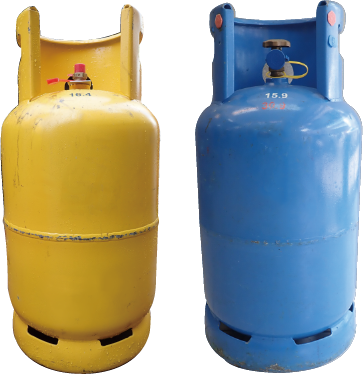 According to the Gas Safety Ordinance (Cap 51), an LPG cylinder is a receptacle which has a water capacity of not more than 150 litres used, or to be used, to contain LPG. Regulation 7(1) of the Gas Safety (Gas Supply) Regulation stipulates that a cylinder shall not be used in Hong Kong unless the Gas Authority is satisfied that the cylinder can be used for containing LPG. In this connection, owners of LPG cylinders shall submit the design of LPG cylinders to the Gas Authority for type approval in writing.
According to the Gas Safety Ordinance (Cap 51), an LPG cylinder is a receptacle which has a water capacity of not more than 150 litres used, or to be used, to contain LPG. Regulation 7(1) of the Gas Safety (Gas Supply) Regulation stipulates that a cylinder shall not be used in Hong Kong unless the Gas Authority is satisfied that the cylinder can be used for containing LPG. In this connection, owners of LPG cylinders shall submit the design of LPG cylinders to the Gas Authority for type approval in writing.
All LPG cylinders shall be periodically examined and inspected to ensure compliance with safety requirements. Regulation 8(2) of the Gas Safety (Gas Supply) Regulation stipulates that a LPG cylinder (other than a disposable cylinder) shall not be used to contain LPG unless the cylinder has been tested and examined not less than once in the five years period immediately preceding such use to ascertain whether the cylinder is safe to be so used. Such examination is commonly known as “revalidation”. Owners of LPG cylinders shall appoint Competent Persons (Class 1b) to supervise the “revalidation” and issue test certificates. For details, please refer to the Code of Practice for Hong Kong LPG Industry, Module 9 (LPG Cylinders) published by the Gas Standards Office.
The Code of Practice can be downloaded from the EMSD’s website at: Home > Gas Safety > Publications > Codes of Practice

Statistics
Gas-related Incident and Prosecution Statistics by Type
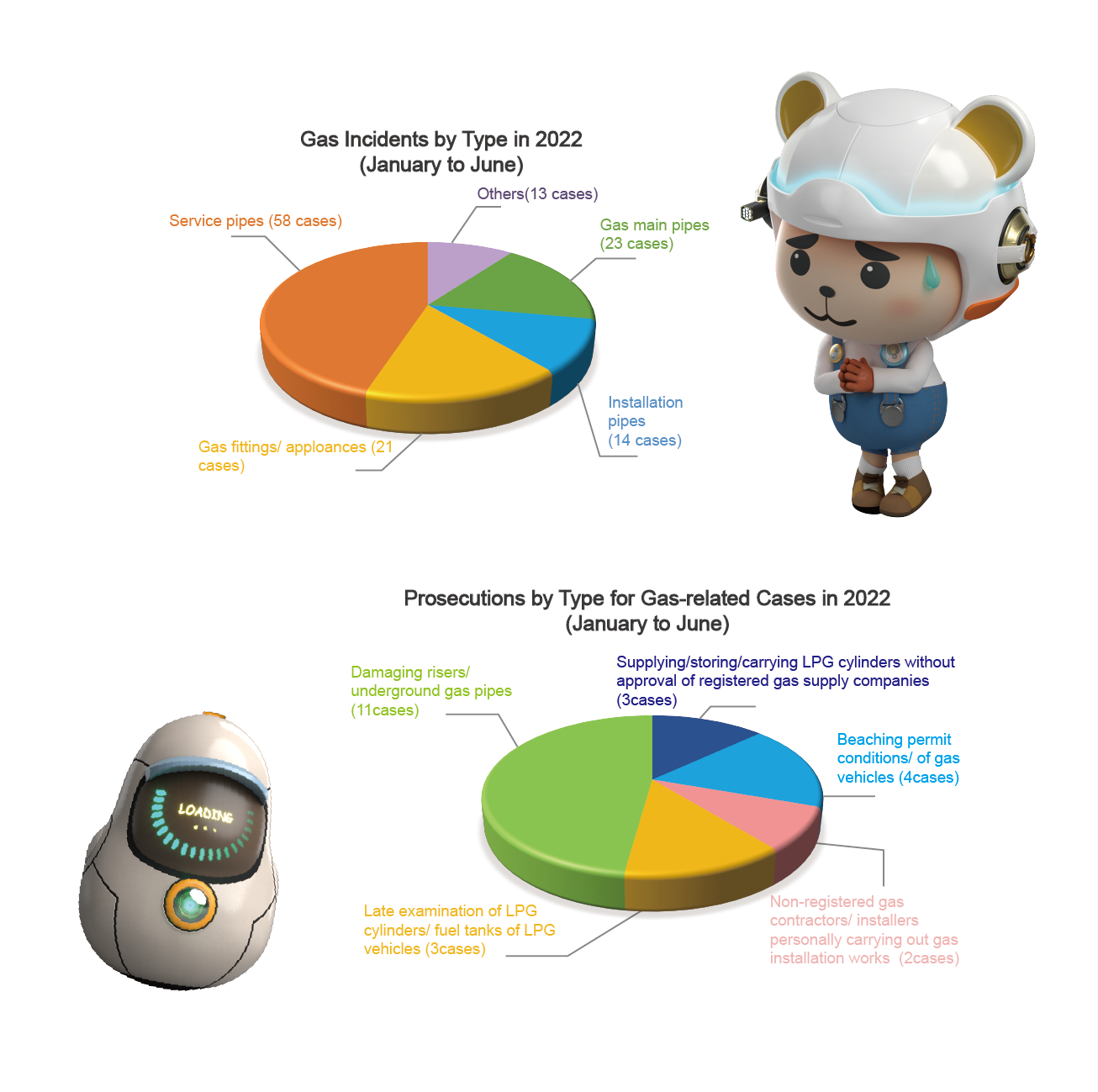
Gas Incidents by Type
in 2022 (January to June)
| Service pipes (58 cases) |
| Gas fittings/ apploances (21 cases) |
| Installation pipes (14 cases) |
| Gas main pipes (23 cases) |
| Others (13 cases) |
Prosecutions by Type for Gas-related Cases
in 2022 (January to June)
| Damaging risers / underground gas pipes (11 cases) |
| Late examination of LPG cylinders / fuel tanks of LPG vehicles (3 cases) |
| Non-registered gas contractors / installers personally carrying out gas installation works (2 cases) |
| Beaching permit conditions / of gas vehicles (4 cases) |
| Supplying/storing / carrying LPG cylinders without approval of registered gas supply companies (3 cases) |
 [PDF format (2.20MB)]
[PDF format (2.20MB)]
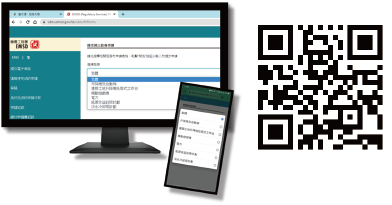 Applicants can submit their applications and supporting documents in e-format through "EMSD (Regulatory Services) Web Based Registration Services" and "iAM Smart +" mobile app, and digitally sign their submissions with "
Applicants can submit their applications and supporting documents in e-format through "EMSD (Regulatory Services) Web Based Registration Services" and "iAM Smart +" mobile app, and digitally sign their submissions with "